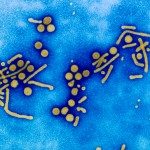Lien vers Pubmed [PMID] – 1718419
Biochemistry 1991 Oct;30(42):10356-61
The P68 protein (referred to as P68 on the basis of its molecular weight of 68,000 in human cells) is a serine/threonine kinase induced by interferon treatment and activated by double-stranded (ds) RNAs. Although extensively studied, little is currently known about the regulation of kinase function at the molecular level. What is known is that activation of this enzyme triggers a series of events which lead to an inhibition of protein synthesis initiation and may, in turn, play an integral role in the antiviral response to interferon. To begin to understand P68 and its biological functions in the eukaryotic cell, we have expressed the protein kinase in Escherichia coli under control of the bacteriophage T7 promoter. In rifampicin-treated cells, metabolically labeled with [35S]methionine and induced by IPTG, the P68 kinase was the predominant labeled product. Further, P68 was recovered from extracts as a fully functional enzyme, shown by its ability to become activated and phosphorylate its natural substrate, the alpha subunit of eukaryotic protein synthesis initiation factor 2 (eIF-2). Moreover, P68 was phosphorylated in vivo in E. coli, providing conclusive evidence that the kinase has the capacity to phosphorylate and activate itself in the absence of other eukaryotic proteins. In contrast, a mutant P68 protein, containing a single amino acid substitution in the invariant lysine in catalytic domain II, was completely inactive. Interestingly, both the mutant and wild-type protein kinases efficiently bound activator dsRNAs despite the fact that only the latter was activated by these RNAs. Finally, the expressed kinase could be isolated from contaminating E. coli proteins in an active form by immunoaffinity chromatography with a monoclonal antibody specific for P68.
